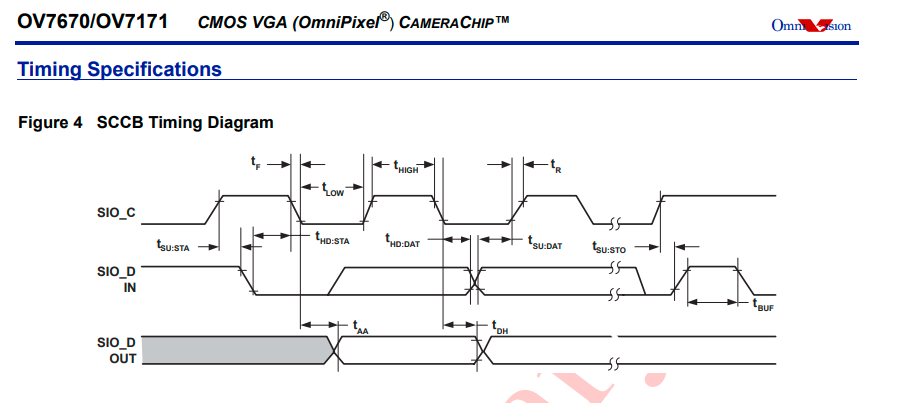I'm looking for a SCCB library for the camera OV7670 and I have been looking everywere for C code that fits OV7670. But the problem is that my SIO_D (Data line) is always 1 when I read the data line.
This type of question is a very common question about the communication problem many SCCB users facing. So my questions are:
- Why are my code only reading the data line as active high?
- Do you know a good working easy to use SCCB library that works?
Codes that I found useful:
https://gist.github.com/muhammadyaseen/75490348a4644dcbc70f https://github.com/ctc8631/ov7670/blob/master/src/OV7670.c#L338
Datasheet for OV7670: http://www.voti.nl/docs/OV7670.pdf
User manual for OV7670: http://www.haoyuelectronics.com/Attachment/OV7670%20+%20AL422B%28FIFO%29%20Camera%20Module%28V2.0%29/OV7670%20Implementation%20Guide%20%28V1.0%29.pdf
My Code:
#define INPUT false
#define OUTPUT true
#define WRITE_ADDRESS 0x42
#define READ_ADDRESS 0x43
#define SIO_CLOCK_DELAY 1
static void delayMicroseconds(uint16_t ms){
HAL_Delay(ms); // TODO: Fixa så det blir ms
}
static void DirSCCB(bool output){
GPIO_InitTypeDef GPIO_InitStructure;
GPIO_InitStructure.Pin = SIO_D_Pin;
GPIO_InitStructure.Pull = GPIO_PULLUP;
GPIO_InitStructure.Speed = GPIO_SPEED_LOW;
GPIO_InitStructure.Mode = output == false ? GPIO_MODE_INPUT : GPIO_MODE_OUTPUT_PP;
HAL_GPIO_Init(SIO_D_GPIO_Port, &GPIO_InitStructure);
}
static void StartSCCB() {
DirSCCB(OUTPUT);
delayMicroseconds(SIO_CLOCK_DELAY);
HAL_GPIO_WritePin(SIO_D_GPIO_Port, SIO_D_Pin, GPIO_PIN_SET);
delayMicroseconds(SIO_CLOCK_DELAY);
HAL_GPIO_WritePin(SIO_C_GPIO_Port, SIO_C_Pin, GPIO_PIN_SET);
delayMicroseconds(SIO_CLOCK_DELAY);
HAL_GPIO_WritePin(SIO_D_GPIO_Port, SIO_D_Pin, GPIO_PIN_RESET);
delayMicroseconds(SIO_CLOCK_DELAY);
HAL_GPIO_WritePin(SIO_C_GPIO_Port, SIO_C_Pin, GPIO_PIN_RESET);
delayMicroseconds(SIO_CLOCK_DELAY);
}
static void StopSCCB() {
HAL_GPIO_WritePin(SIO_D_GPIO_Port, SIO_D_Pin, GPIO_PIN_RESET);
delayMicroseconds(SIO_CLOCK_DELAY);
HAL_GPIO_WritePin(SIO_C_GPIO_Port, SIO_C_Pin, GPIO_PIN_SET);
delayMicroseconds(SIO_CLOCK_DELAY);
HAL_GPIO_WritePin(SIO_D_GPIO_Port, SIO_D_Pin, GPIO_PIN_SET);
delayMicroseconds(SIO_CLOCK_DELAY);
}
void NoAckSSCB(){
HAL_GPIO_WritePin(SIO_D_GPIO_Port, SIO_D_Pin, GPIO_PIN_SET);
delayMicroseconds(SIO_CLOCK_DELAY);
HAL_GPIO_WritePin(SIO_C_GPIO_Port, SIO_C_Pin, GPIO_PIN_SET);
delayMicroseconds(SIO_CLOCK_DELAY);
HAL_GPIO_WritePin(SIO_C_GPIO_Port, SIO_C_Pin, GPIO_PIN_RESET);
delayMicroseconds(SIO_CLOCK_DELAY);
HAL_GPIO_WritePin(SIO_D_GPIO_Port, SIO_D_Pin, GPIO_PIN_RESET);
delayMicroseconds(SIO_CLOCK_DELAY);
}
static bool SCCBWrite(uint8_t m_data){
uint8_t j;
bool success;
//Loop transmit data 8 times
for (j = 0; j < 8; j++){
if((m_data << j) & 0x80 )
HAL_GPIO_WritePin(SIO_D_GPIO_Port, SIO_D_Pin, GPIO_PIN_SET);
else
HAL_GPIO_WritePin(SIO_D_GPIO_Port, SIO_D_Pin, GPIO_PIN_RESET);
delayMicroseconds(SIO_CLOCK_DELAY);
HAL_GPIO_WritePin(SIO_C_GPIO_Port, SIO_C_Pin, GPIO_PIN_SET);
delayMicroseconds(SIO_CLOCK_DELAY);
HAL_GPIO_WritePin(SIO_C_GPIO_Port, SIO_C_Pin, GPIO_PIN_RESET);
delayMicroseconds(SIO_CLOCK_DELAY);
}
HAL_GPIO_WritePin(SIO_D_GPIO_Port, SIO_D_Pin, GPIO_PIN_RESET);
delayMicroseconds(SIO_CLOCK_DELAY);
// Change to input
DirSCCB(INPUT);
delayMicroseconds(SIO_CLOCK_DELAY);
HAL_GPIO_WritePin(SIO_C_GPIO_Port, SIO_C_Pin, GPIO_PIN_SET);
delayMicroseconds(SIO_CLOCK_DELAY);
if(HAL_GPIO_ReadPin(SIO_D_GPIO_Port, SIO_D_Pin) == GPIO_PIN_SET)
success = false;
else
success = true;
HAL_GPIO_WritePin(SIO_C_GPIO_Port, SIO_C_Pin, GPIO_PIN_RESET);
delayMicroseconds(SIO_CLOCK_DELAY);
// Change to output
DirSCCB(OUTPUT);
delayMicroseconds(SIO_CLOCK_DELAY);
return success;
}
static uint8_t SCCBRead(){
// Prepare
uint8_t data = 0;
DirSCCB(INPUT);
delayMicroseconds(SIO_CLOCK_DELAY);
// Loop
for(uint8_t i = 8; i > 0; i--){
delayMicroseconds(SIO_CLOCK_DELAY);
HAL_GPIO_WritePin(SIO_C_GPIO_Port, SIO_C_Pin, GPIO_PIN_SET);
delayMicroseconds(SIO_CLOCK_DELAY);
data = data << 1;
if(HAL_GPIO_ReadPin(SIO_D_GPIO_Port, SIO_D_Pin))
data++;
HAL_GPIO_WritePin(SIO_C_GPIO_Port, SIO_C_Pin, GPIO_PIN_RESET);
delayMicroseconds(SIO_CLOCK_DELAY);
}
return data;
}
bool InitOV7670(){
// Hardware reset
HAL_GPIO_WritePin(CAMERA_RESET_GPIO_Port, CAMERA_RESET_Pin, GPIO_PIN_SET);
delayMicroseconds(SIO_CLOCK_DELAY);
HAL_GPIO_WritePin(CAMERA_RESET_GPIO_Port, CAMERA_RESET_Pin, GPIO_PIN_RESET);
delayMicroseconds(SIO_CLOCK_DELAY);
// Software reset
if(!WriteOV7670(COM7, COM7_VALUE_RESET))
return false;
else
return true;
}
bool WriteOV7670(uint8_t reg, uint8_t data){
StartSCCB();
if(!SCCBWrite(WRITE_ADDRESS)){
StopSCCB();
return false;
}
delayMicroseconds(SIO_CLOCK_DELAY);
if(!SCCBWrite(reg)){
StopSCCB();
return false;
}
delayMicroseconds(SIO_CLOCK_DELAY);
if(!SCCBWrite(data)){
StopSCCB();
return false;
}
StopSCCB();
return true;
}
bool ReadOV7670(uint8_t reg, uint8_t *data){
StartSCCB();
if(!SCCBWrite(WRITE_ADDRESS)){
StopSCCB();
return false;
}
delayMicroseconds(SIO_CLOCK_DELAY);
// Write data (Address of register in Camera Module)on SCCB/I2C interface
if(!SCCBWrite(reg)){
StopSCCB();
return false;
}
delayMicroseconds(SIO_CLOCK_DELAY);
StopSCCB();
delayMicroseconds(SIO_CLOCK_DELAY);
StartSCCB();
// Write data (Address of slave device for Read) on SCCB/I2C interface
if(!SCCBWrite(READ_ADDRESS)){
StopSCCB();
return false;
}
delayMicroseconds(SIO_CLOCK_DELAY);
// Received data from Camera Module (SCCB/I2C)
*data = SCCBRead();
NoAckSSCB();
StopSCCB();
return true;
}

